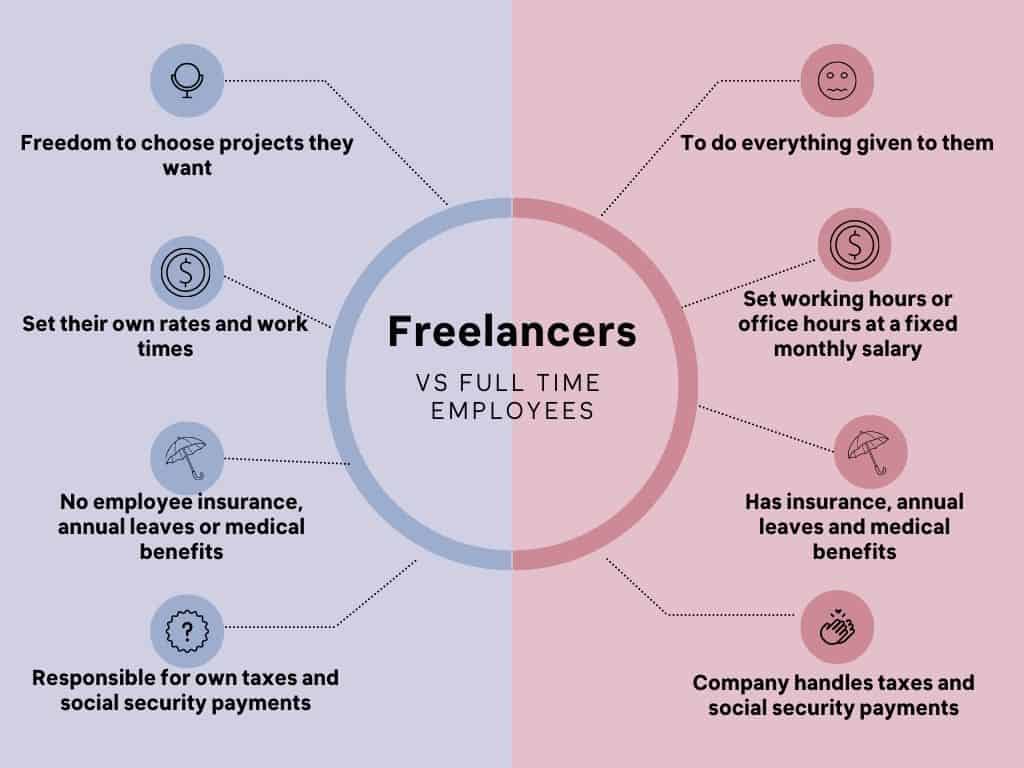This post may contain affiliate links. If you use these links to buy something we may earn a commission at no extra cost to you. Thank you for your support!
According to Exploding Topics, there are now over 73.3 million freelancers in the United States alone in 2023. Wow much?
If you’re looking to work independently and set your own schedule, freelance contracting might be the right choice for you. Freelance contractors are self-employed workers who offer their services to multiple clients and organizations. They can work on a per-project or per-task basis and have the freedom to choose the projects they work on, set their own rates, and work from anywhere.
So what is a freelance contractor and what does it entail? As a freelancer, you’re responsible for managing your own taxes, health insurance, and other benefits. You’re also responsible for finding your own clients and building your own network. However, the benefits of freelance contracting include the ability to work on a variety of projects, the flexibility to set your own hours, and the potential to earn more money than you would in a traditional 9-to-5 job.
If you’re self-motivated, organized, and have a skill set that’s in demand, freelance contracting might be a great option for you. (hear, hear!)
Understanding Freelance Contractors: An Overview

As a freelance contractor, you are a non-permanent, self-employed worker who provides products and services to multiple organizations. You are not an employee of any of the organizations you work for, and you are responsible for your own taxes and Social Security payments. Freelance contractors can work for as many clients as their schedule allows, and they have the freedom to choose where they work and set their own rates.
Freelance contractors are not entitled to employee benefits such as health insurance, sick leave, or unemployment insurance. However, you have the freedom to work on your own schedules and to choose the scope of work that you take on. You are your own boss, and you set your own rates.
The key differences between freelance contractors and full-time employees are the nature of the employer-employee relationship and the way in which employment taxes are paid. Freelance contractors are self-employed workers who work on a project-by-project basis and are paid either an hourly rate or a flat fee for the result of their work. They are responsible for their own self-employment tax, which is calculated based on their earnings as a self-employed individual.
Freelance contractors are often hired for short-term projects or on a temporary basis, but they may also work on larger projects or on long-term contracts. They may work in a variety of fields, such as graphic design, web development, or freelance writing. Freelance contractors may work from their own home office or from the client’s office, depending on the specific role and project requirements.
When working as a freelance contractor, it is important to have a clear understanding of your legal agreements and the various options available to you (more on this later). It is a good idea to seek legal advice and to carefully review the terms and conditions of any contracts before signing them. You should also be aware of the hiring process and job security associated with freelance work.
In general, freelance work can be a good option for those who prefer the flexibility and independence of self-employment. However, it may not be the best choice for those who require the stability and benefits associated with full-time employment. As a freelance contractor, you will need to be proactive in finding new clients and managing your workload, but you will also have the freedom to choose the type of work you do and the hours you work.
Differences Between An Independent Contractor And A Freelancer
When it comes to working as an independent contractor or a freelancer, there are some key differences to keep in mind. Here are some of the main differences:
Client Relationships
As a freelancer, you typically work with multiple clients at the same time, while independent contractors often work for a single client for the duration of a specific project or a set period of time.
Scope of Work
Independent contractors are often brought on for a specific role or project, while freelancers tend to work on a variety of short-term and long-term projects with varying scopes of work.
Taxes
Freelancers are self-employed and are responsible for paying their own taxes, while independent contractors may have their taxes withheld by their client. Both freelancers and independent contractors are responsible for paying self-employment taxes.
Benefits
Freelancers are not typically eligible for employee benefits, such as health insurance or sick leave, while independent contractors may be eligible for benefits depending on the terms of their contract.
Rates and Schedules
As a freelancer, you have the freedom to set your own rates and work schedule, while independent contractors may have less flexibility in these areas depending on the terms of their contract.
Client Acquisition
Freelancers are often responsible for finding and securing their own clients, while independent contractors may be hired by a company or agency for a specific project.
Work Agreements
Freelancers often work on a project-by-project basis and may use a freelance contract to outline the terms of their work, while independent contractors may have a more formal contract or agreement in place.
Overall, the main difference between an independent contractor and a freelancer is the nature of their client relationships and the scope of their work. As a freelancer, you have more control over your schedule and the types of projects you take on, while independent contractors may have a more defined role and work on a specific project or for a single client for a set period of time.
Comparing Freelance Contractors and Full-Time Employees
When deciding whether to work as a freelance contractor or a full-time employee, there are several key differences to consider. As a freelance contractor, you are an independent worker who is responsible for your own taxes and benefits. On the other hand, as a full-time employee, you work for a specific company and are entitled to employee benefits, such as health insurance and sick leave.
One of the main differences between freelance contractors and full-time employees is the scope of work. Freelance contractors often work on a specific project or short-term basis, while full-time employees work on larger projects over a longer period of time. As a freelance contractor, you have the freedom to choose your own clients and set your own rates, but you may have fewer clients and less job security compared to a full-time employee, especially if you’re just starting out.
Another key difference is the employer-employee relationship. As a freelance contractor, you are considered an external employee and do not have the same legal agreements and protections as a full-time employee. You are responsible for your own workspace and equipment, and may work from home or a client’s office. As a full-time employee, you have more job security and may be eligible for unemployment insurance if you lose your job.
When it comes to taxes, freelance contractors are responsible for paying their own self-employment tax, which includes both social security and Medicare taxes. As a full-time employee, these taxes are automatically deducted from your paycheck. Freelance contractors also have the option to deduct certain business expenses, such as their home office or equipment, from their taxes.
In creative fields such as graphic design and web development, freelance work is often the norm. Freelance writers, for example, may work on a flat fee or hourly rate for various clients, while web designers may take on short-term projects for small businesses. However, for those seeking a more stable income and job security, a full-time job may be the best choice.
The Gig Economy and Freelance Contractors
If you’re considering becoming a freelance contractor, it’s important to understand the gig economy and how it works. The gig economy refers to the growing trend of short-term, contract-based work that is done on a project-by-project basis. Freelance workers are a major part of the gig economy, and they are typically self-employed individuals who work on their own schedules and are responsible for their own taxes.
One of the key differences between freelance contractors and full-time employees is that freelancers are not entitled to employee benefits such as health insurance, sick leave, or unemployment insurance. As a self-employed worker, you are responsible for your own health insurance and must pay self-employment tax. However, you can set your own rates and work on projects that interest you.
Freelance contractors can work on a short-term or long-term basis, depending on the scope of the project. Some freelancers work with a single client for an extended period of time, while others take on multiple clients for shorter projects. As a general rule, freelance work is done on a flat fee (ie a monthly retainer) or hourly rate basis.
If you’re a freelance writer, web designer, or graphic designer, you may find that freelance work is your best option. However, if you’re looking for more stability and job security, a full-time job may be a better choice.
In the eyes of the IRS, there is a big difference between being an independent contractor and an employee. It’s important to understand the criteria that the IRS uses to determine whether you are an independent contractor or an employee. This can help you avoid legal issues and ensure that you’re paying the correct taxes.
Managing Taxes as a Freelance Contractor
As a freelance contractor, managing your taxes is an important part of your business. Unlike full-time employees, you are responsible for paying your own taxes, including self-employment tax, social security, and Medicare taxes.
When you work as an independent contractor, you are responsible for reporting your income and expenses on Schedule C of your tax return. You must also pay estimated taxes quarterly to avoid any penalties. The IRS requires you to pay self-employment tax on your net earnings, which is your income minus your expenses.
It is important to keep track of your income and expenses throughout the year to make filing your taxes easier. You can use accounting software or hire an accountant to help you manage your finances.
Scope of Work for Freelance Contractors
As a freelance contractor, the scope of work you take on can vary greatly. You may work on a specific project basis, taking on short-term projects for various clients, or you may work on larger, long-term projects for a single client. Unlike full-time employees, freelance workers are self-employed and responsible for their own taxes and social security. They do not receive employee benefits and must pay for their own health insurance.
When taking on a new client, it is important to clearly define the scope of work for the project. This includes outlining the specific tasks and deliverables, as well as the timeframe for completion. As a general rule, it is a good idea to include a description of the work to be done in your contract, to avoid scope creep where the amount of work within the project increases without a change in budget or payment.
Freelance contractors typically charge an hourly rate or a flat fee for their services. As an independent worker, you have the freedom to set your own rates and work on your own schedule. However, it is important to keep in mind that you will be responsible for paying self-employment tax.
Always have legal agreements in place to protect both parties. It may be a good idea to seek legal advice to ensure that your contracts are legally binding and protect your interests.
Freelance Contractors and Client Relationships
As a freelance contractor, you have the freedom to work with multiple clients simultaneously. This means that you have the opportunity to build relationships with a variety of businesses, both big and small. However, it’s important to understand the dynamics of these relationships and how they differ from those of a traditional employee.
When working with new clients, it’s important to establish clear communication from the start. This includes discussing the scope of work, deadlines, and expectations. As a freelance worker, you are responsible for your own taxes and Social Security contributions, so it’s important to factor these costs into your hourly rate or flat fee.
For longer-term clients, you may be hired on a retainer model, where you provide a monthly service for a fixed price. This can be a great way to establish a steady income stream and build a strong relationship with a client. However, it’s important to have a clear agreement in place outlining the terms of the retainer.
When it comes to client relationships, it’s important to be transparent about your availability and workload. Taking on too many clients can lead to burnout and a decline in the quality of your work. Conversely, having too few clients can lead to financial instability.
The Legal Aspect of Freelance Contracting
As a freelance contractor, you are essentially your own small business, and generally, the law treats you as a business, not as an employee. This means that you are responsible for your own taxes, social security, and other benefits.
When it comes to legal agreements, experienced independent contractors who understand the legal requirements for freelancers might ask you to sign a contract that they or their lawyer has prepared. These agreements usually provide expanded details on various aspects of the freelancer-company relationship, such as the scope of work, who will be involved in the feedback process, and specific project timelines.
As a freelance worker, you have the freedom to set your own rates and choose where to work, but you must also be aware of the legal requirements for freelancers. For example, you need to make sure you are properly classified as an independent contractor and not an employee, as this can impact your taxes and other benefits.
If you are a freelancer who works on a short-term basis, it may be a good idea to have your own legal advice to ensure that you are complying with all the necessary regulations and laws. This can help you avoid any potential legal issues down the line.
When it comes to the specific role of the freelancer, it’s important to have a clear scope of work outlined in the contract. This should include details such as the hourly rate or flat fee, the period of time the work will be completed in, and the result of the work.
Freelancing can be a great choice for those who want to work on short-term or long-term projects, have their own schedules, and be their own boss. However, it’s important to be aware of the legal requirements for freelancers and to have a clear understanding of the terms of your contract.
Examples Of Freelance Contractors in Different Fields
As a freelance contractor, you have the flexibility to work in various fields. Some of the most common fields for freelance work include graphic design, web development, and creative fields such as writing, photography, and videography.
In graphic design, freelance contractors work on a project-by-project basis, creating designs such as logos, advertisements, and website layouts. They may work for a single client or multiple clients, and they set their own rates and schedules.
Web developers also work as freelance contractors, creating and maintaining websites for clients. They may specialize in front-end development, back-end development, or full-stack development, and they typically work on a project-by-project basis.
Freelance contractors in creative fields, such as writing and photography, work on a per-project or per-hour basis, creating content for clients such as articles, blog posts, and images. They may work for a single client or multiple clients, and they set their own rates and schedules.
Challenges and Benefits of Being a Freelance Contractor
As a freelance contractor, you have the freedom to work on your own terms. However, there are also challenges that come with this type of work. Here are some of the benefits and challenges of being a freelance contractor:
Benefits of Being a Freelance Contractor
- Flexibility: You have the freedom to work on your own schedule and choose the projects you want to work on. This gives you the ability to balance your work and personal life more effectively.
- Higher Hourly Rates: As a freelance contractor, you have the ability to set your own rates. This gives you the opportunity to earn more money than you would as a traditional employee.
- Independence: As a freelance contractor, you are your own boss. You have the freedom to make decisions about your work and take control of your career.
- Variety of Work: Freelance contractors have the ability to work on a variety of projects with different clients. This can be a great way to expand your skills and experience.
Challenges of Being a Freelance Contractor
- No Employee Benefits: As a freelance contractor, you are responsible for your own health insurance, sick leave, and other benefits that traditional employees receive.
- Uncertainty: Freelance work is not always steady, and it can be difficult to predict how much work you will have in the future.
- Self-Employment Taxes: Freelance contractors are responsible for paying their own taxes, including self-employment taxes.
- Hiring Process: Freelance contractors are responsible for finding their own clients and projects. This can be challenging, especially when starting out.
- Job Security: Freelance work is not as secure as traditional employment. You may have to deal with periods of unemployment between projects.
Conclusion
While the general rule is that freelancers work on a project-by-project basis, independent contractors work for a specific period of time and are more likely to have an employer-employee relationship with their clients.
It’s a good idea to clearly define your work schedules and expectations in your freelance contract to avoid any misunderstandings with your clients. Be sure to include all the necessary sections of your freelance contract, such as payment terms, intellectual property rights, and termination clauses.
One big difference between freelancers and independent contractors is how they are viewed in the eyes of the IRS. Freelancers are considered external employees, while independent contractors are considered temporary workers. This can have an impact on how you file your taxes and how much you owe.
Overall, being a freelancer can be a great way to earn a living, but it’s important to understand what it means to be a freelancer and how it differs from being an independent contractor. With the right mindset and approach, you can build a successful freelance career and enjoy the freedom and flexibility that comes with it.





